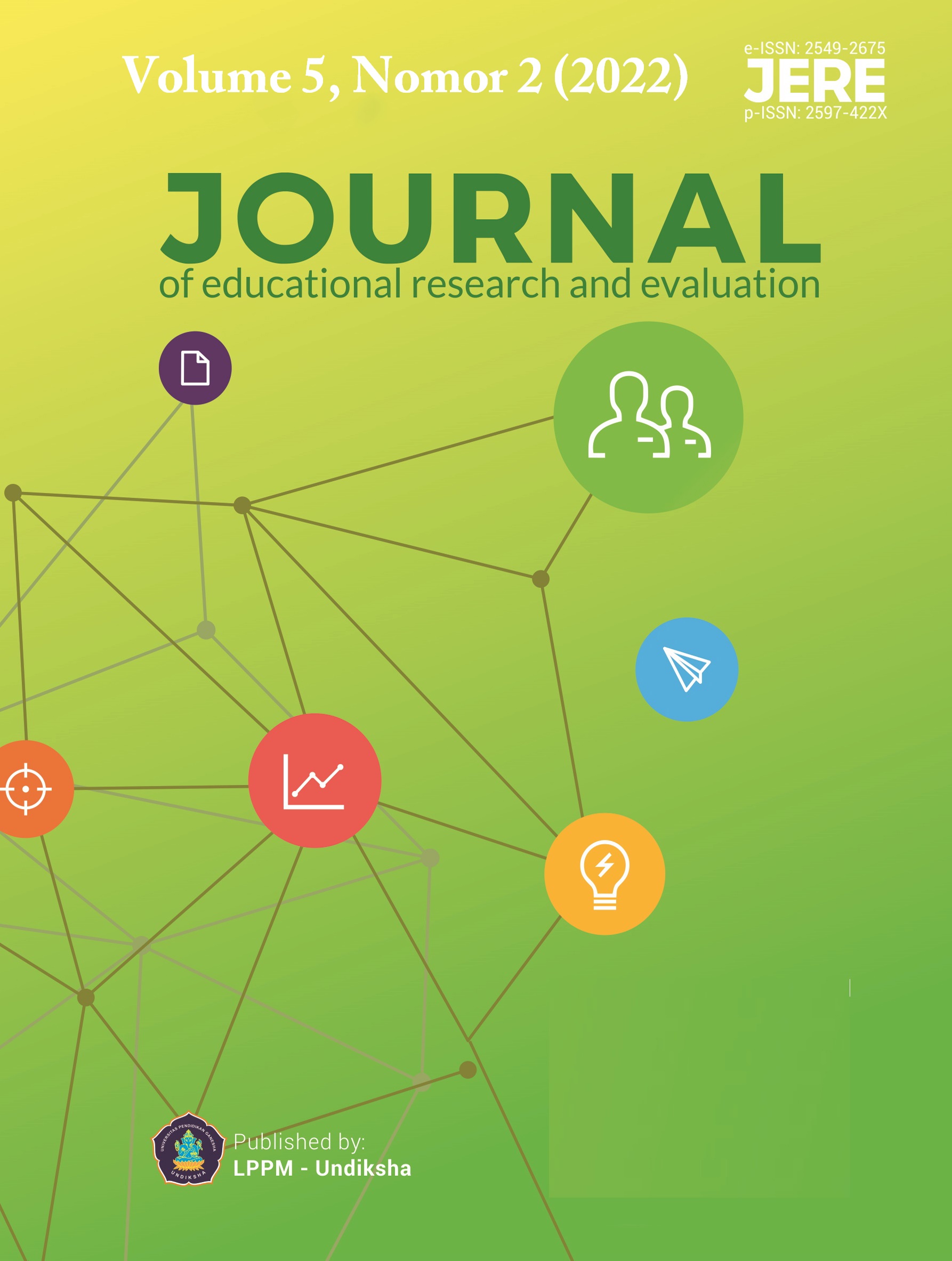Online Learning with Project Based Learning Approach in the Human Performance Technology Course
DOI:
https://doi.org/10.23887/jere.v5i2.32387Keywords:
Online Learning, Design, Project Based LearningAbstract
The development of the era and the 4.0 revolution requires universities to be able to answer challenges to face technological advances and competition in the world of work in the era of globalization. Online learning is a form of learning that can answer the times, technological advances and knowledge of learning development in universities. This study aims to design the online learning with Project Based Learning approach in the Human Performance Technology course. This study uses the R&D method in designing online learning. The online learning design is carried out using the PEDATI model. The PEDATI model itself has several design steps starting from formulating online learning, mapping material, determining asynchronous or synchronous and designing the selected learning path. Asynchronous learning at PEDATI which consists of, deepening, applying and evaluating with a project-based learning approach that has six steps. The results of the research resulted in an online learning design which consisted of formulating learning outcomes, mapping materials, making asynchronous learning flows combined with project-based learning syntax. Selection of materials, forms of discussion, assignments to evaluation forms can be arranged in such a way and combined with the LMS used. Online learning designs that are designed with the right learning activities can make learning more meaningful for students. With online learning, face-to-face learning can be a means of discussion rather than just delivering material.
References
Abdel Halim, S. M. (2011). Improving EFL majors’ critical reading skills and political awareness: A proposed translation program. International Journal of Educational Research, 50(5–6), 336–348. https://doi.org/10.1016/j.ijer.2011.11.003.
Budiyono, B. (2020). Inovasi Pemanfaatan Teknologi Sebagai Media Pembelajaran di Era Revolusi 4.0. Jurnal Kependidikan: Jurnal Hasil Penelitian Dan Kajian Kepustakaan Di Bidang Pendidikan, Pengajaran Dan Pembelajaran, 6(2), 300. https://doi.org/10.33394/jk.v6i2.2475.
Dabbagh, N., & Bannan-Ritland, B. (2005). Online learning: Concepts, strategies, and application. Pearson.
Eliyana, E. (2020). Analisis Keterampilan Proses Sains Siswa Belajar IPA Materi Tumbuhan Hijau Pada Siswa Kelas V SDN 3 Panjerejo di Masa Pandemi Covid-19. EDUPROXIMA : Jurnal Ilmiah Pendidikan IPA, 2(2), 87. https://doi.org/10.29100/eduproxima.v2i2.1628.
Febriantoro, W. (2018). Blended Learning Instructional Design Development On The Prepackaged Products Training Using Pedati Model. Science, Engineering, Education, and Development Studies (SEEDS): Conference Series. https://jurnal.uns.ac.id/seeds/article/view/24648.
Fitriyani, Y., Fauzi, I., & Sari, M. Z. (2020). Motivasi Belajar Mahasiswa Pada Pembelajaran Daring Selama Pandemik Covid-19. Jurnal Kependidikan: Jurnal Hasil Penelitian Dan Kajian Kepustakaan Di Bidang Pendidikan, Pengajaran Dan Pembelajaran, 6(2), 165–175. https://doi.org/10.23917/ppd.v7i1.10973.
Iswatiningsih, D., Fauzan, Dluhayati, & Lestari, Y. K. (2020). Efektivitas Pembelajaran Bahasa Indonesia Daring di Masa Pandemi COVID-19 Dalam Meningkatkan Kemampuan Berbahasa Siswa SMP. Jurnal Pendidikan, Kebahasaan Dan Kesustraan Indonesia, 5, 141–156.
Izati, S. N., Wahyudi, & Sugiyarti, M. (2018). Project Based learning berbasis Literasi untuk Meningkatkan Hasil Belajar Tematik. Jurnal Pendidikan, 3(9), 1122–1127. https://doi.org/10.17977/jptpp.v3i9.11508.
Lasamahu, B., Siregar, E., & Sukardjo, M. (2021). Using PEDATI Model to Design Online Learning with Project Based Learning Approach in the Human Performance Technology Course. Journal of Education Research and Evaluation, 5(2). https://doi.org/10.23887/jere.v5i2.32387.
Logan, R. M., Johnson, C. E., & Worsham, J. W. (2021). Development of an E-learning Module to Facilitate Student Learning and Outcomes. Teaching and Learning in Nursing, 16(2), 139–142. https://doi.org/10.1016/j.teln.2020.10.007.
Majid, A. H. A., & Stapa, S. H. (2017). The use of scaffolding technique via Facebook in improving descriptive writing among ESL Learners. 3L: Language, Linguistics, Literature, 23(4), 77–88. https://doi.org/10.17576/3L-2017-2304-07.
Marzuki, & Basariah. (2017). The Influence Of Problem-Based Learning And Project Citizen Model In The Civic Education Learning On Student’scritical Thinking Ability And Self Discipline. Cakrawala Pendidikan, 6(3), 382–400.
Mustofa, M., Chodzirin, M., Sayekti, L., & Fauzan, R. (2019). Formulasi Model Perkuliahan Daring Sebagai Upaya Menekan Disparitas Kualitas Perguruan Tinggi. Walisongo Journal of Information Technology, 1(2), 151–160. https://doi.org/10.21580/wjit.2019.1.2.4067.
Nash, M., & Churchill, B. (2020). Caring during COVID-19: A gendered analysis of Australian university responses to managing remote working and caring responsibilities. Gender, Work and Organization, 27(5), 833–846. https://doi.org/10.1111/gwao.12484.
Prawiradilaga, D. S., & Chaeruman, U. A. (2018). Modul Hypercontent Teknologi Kinerja (Performance Technology). Kencana.
Satrianingrum, A. P., & Prasetyo, I. (2020). Persepsi Guru Dampak Pandemi Covid-19 terhadap Pelaksanaan Pembelajaran Daring di PAUD. Jurnal Obsesi : Jurnal Pendidikan Anak Usia Dini, 5(1), 633. https://doi.org/10.31004/obsesi.v5i1.574.
Siripongdee, K., Pimdee, P., & Tuntiwongwanich, S. (2020). A blended learning model with IoT-based technology: effectively used when the COVID-19 pandemic? Journal for the Education of Gifted Young Scientists, 8(2), 905–917. https://doi.org/10.17478/jegys.698869.
Sugiyono. (2015). Metode Penelitian Pendidikan pendekatan Kuantitatif, Kualitatif dan R&D. Alfabeta, Bandung.
Tegeh, I. M., Jampel, I. N., & Pudjawan, K. (2015). Pengembangan buku ajar model penelitian pengembangan dengan model ADDIE. Seminar Nasional Riset Inovatif.
Yuzulia, I. (2021). The Challenges Of Online Learning During Pandemic: Students ’ V oice. Jurnal Bahasa Dan Sastra, 13(1), 8–12. https://doi.org/10.31294/w.v13i1.9759.
Downloads
Published
How to Cite
Issue
Section
License
Authors who publish with the Journal of Evaluation and Research in Education (JERE) agree to the following terms:
- Authors retain copyright and grant the journal the right of first publication with the work simultaneously licensed under a Creative Commons Attribution License (CC BY-SA 4.0) that allows others to share the work with an acknowledgment of the work's authorship and initial publication in this journal.
- Authors are able to enter into separate, additional contractual arrangements for the non-exclusive distribution of the journal's published version of the work (e.g., post it to an institutional repository or publish it in a book), with an acknowledgment of its initial publication in this journal.
- Authors are permitted and encouraged to post their work online (e.g., in institutional repositories or on their website) prior to and during the submission process, as it can lead to productive exchanges, as well as earlier and greater citation of published work. (See The Effect of Open Access)











